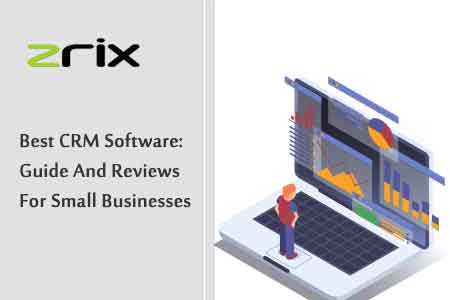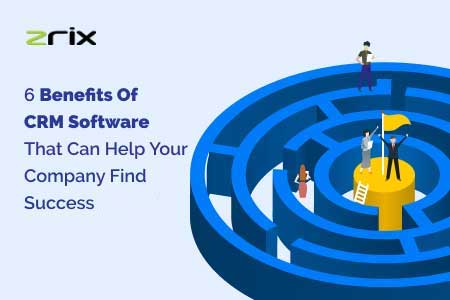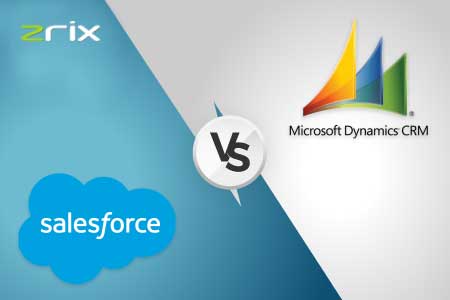Patients nowadays expect easy access to the highly personalized healthcare system and services, with proper privacy, security, and fewer challenges. They look more informed and meticulously involved in selecting their healthcare providers.
However, due to the, current COVID-19 Coronavirus pandemic and loosely molded healthcare systems the world governments are unable to maintain a 360-degree focus on the processes of hospitals, clinics, dispensaries, test labs, pharmaceutical shops, and the companies providing healthcare technologies.
Furthermore, it is decreasing the quality of the patient care system and is resulting in more deaths and an increase in daily virus infection cases.
It is not only about the current virus scenarios, but the patients aren’t getting fast, easy, affordable, and one-to-one health-related services for a long time. In addition to patient expectations, the more significant challenge is to keep the healthcare data safe and secure.
Quick Navigation
Around three weeks ago, Maryland's elderly healthcare provider Lorien Health Service was hit by NetWalker ransomware and resulted in the data breach of 47,000 individuals causing their security and privacy at risk!
Likewise, in the last few months, many data breach activities and cyberattacks happened in the US, UK, and European healthcare companies.
Therefore, taking lessons from the present situations and health requirements of the people, we need to adopt a robust 'patient-centric' healthcare system that focuses on giving quality care. This is possible if we automate and modernize the essential healthcare workflow elements by adopting the latest technologies and trends in the healthcare industry.
Here, you will find everything about the healthcare CRM software (Customer Relationship Management Software). Beyond that, you will also learn the right strategy to make a CRM for healthcare service providers.
Let's just look at every minute detail on CRM for the healthcare industry!
A Brief Guide on Healthcare CRM Solutions!
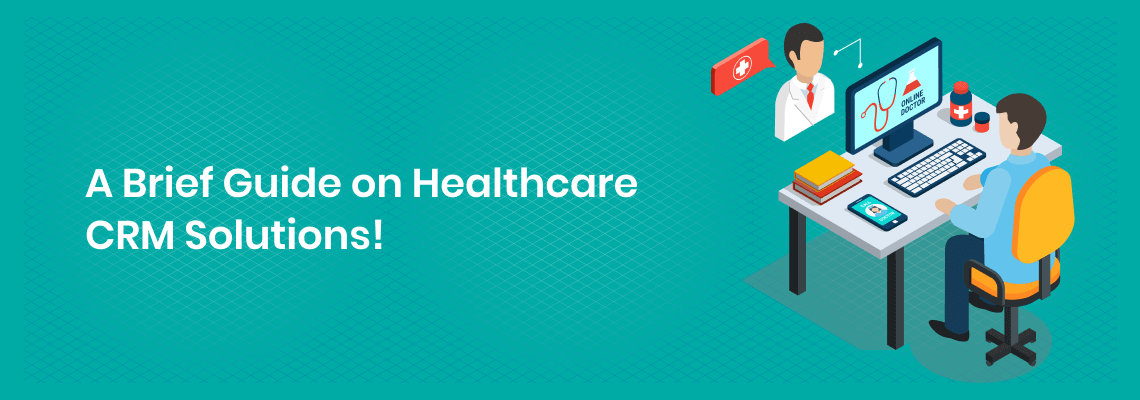
Basically, a CRM focuses on improving relationships in business (B2C/B2B) with the customers and new potential customers by managing marketing, customer interaction, lead conversion, etc. As a result, a CRM facilitates customers, streamline business processes, takes care of the staff, and improves profitability.
In the same way, a CRM in the healthcare sector is called Healthcare CRM!
Healthcare CRM (HCRM) is not a new term. It has been in the market for many years! This is business software for healthcare service providers whose job is to integrate Patients (consumers/customers) social, clinical, and health-related details into an individual profile.
Additionally, these software solutions also weave EHRs (Electronic Health Records), EMRs (Electronic Medical Records), PMS (Patient Management System), and cutting edge marketing tools with them.
According to the survey and report, the global healthcare CRM market will exponentially reach $17.4 billion in 2023 at a CAGR of 14.6% from 8.8 billion in 2018.
Today, CRM software is becoming an integral part of healthcare companies as it positively impacts on business processes. Also, it helps in scaling the business operations, emphasizes growing the rate of health outcomes, and actively manages the patient relationship with the staff members like doctors, nurses, lab assistants, pharmacists, etc.
Thus, CRM creates a very caring environment where patients, new customers, healthcare services, employees, and staff members are closely linked to each other. Moreover, these software systems are more helpful for small and medium-sized healthcare providers who deliver personalized care.
There are many leaders in healthcare CRM development. For example, Salesforce (USA), Microsoft (USA), SAP SE (Germany), Oracle (USA), IBM (USA), SugarCRM (USA), Accenture (Ireland), Healthgrades (USA), and Infor (USA) are the best healthcare CRM solutions providers.
Among these, Salesforce is the key player with 22% of the global healthcare CRM market.
A CRM in any industry works on the principle ‘doing more and at less cost’ for better customer relationships. This way, CRM in the healthcare sector gives benefits to end-users such as Medical Service Providers, Service Consumers, Pharmaceutical Organizations, and Medical Devices Sellers.
What Are The Use Cases of Healthcare CRM?
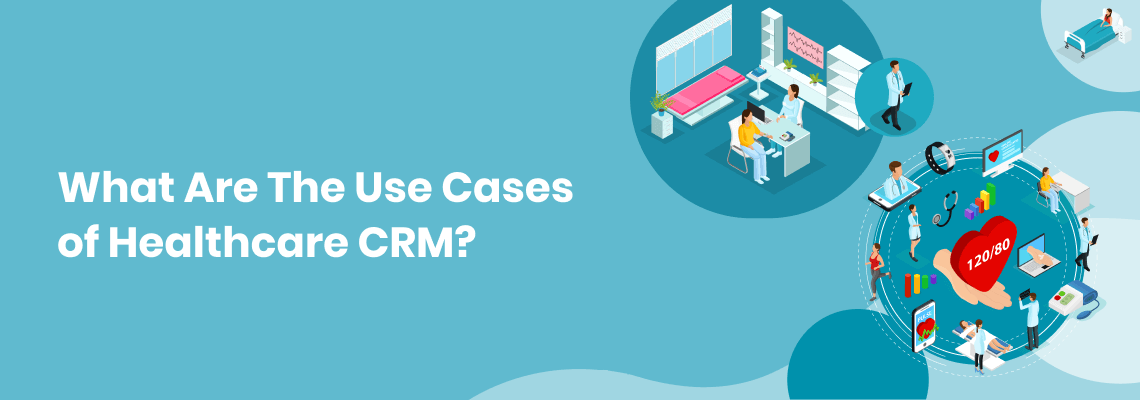
From our above discussions, we know that CRMs streamline and automate the sales marketing process. Likewise, the HCRM in integration with EHRs, EMRs, QMS (Quality Management System), other databases, appointment calendars, and care-delivery tools works for the betterment of healthcare services.
APIs for human resources management (HRM), medical billing, accounting, and other back-office systems are also a part of HCRM. We can clearly state out that these CRMs are the best IT solutions for the healthcare industry in USA that can be used in the following -
- Monitoring medical equipment
- Reporting, scheduling & alert system
- Care intensive environment via team collaboration
- Easy patient case management & optimization
- Automated pre-discharge and post-discharge patients follow-up
- Gather & sync PHI across multiple facilities
- Run marketing campaigns for different trials of different diseases
- Creates better internet communication processes
- Evaluating staff performance
- Consolidate PHI in a centralized database
Along with the above use cases, a CRM benefits a lot in the healthcare sector as follows:
- Tracks the engagement tactics and report the conversions
- Analyze consumer and patient populations
- Tracks multi-channel marketing via social media, SMS, mails, direct emails, etc
- Use actionable data and strategically plan and execute marketing campaigns
- Increase patient engagement with more personalized outreach based on collected data
- To make a complete profile of the patient, it integrates data from multiple sources
Some other benefits of CRM are: upscaling the speed of business operations, simplifying the administrative routine, advancement in medical processes, and putting a positive impact on internal and external communications.
Also Read: Salesforce CRM vs Microsoft Dynamics CRM
A medical specialist often thinks that a successful treatment satisfies the patients and brings engagement. However, that’s not true because patient satisfaction reciprocates to many things such as comfortable hospital beds, easy to access test reports, report archives, amiable front-desk assistant, data privacy, healthy food, and many more things.
There is not a clear definition of a good healthcare provider because 60% of the world population wants affordable and genuine treatments and health services.
Thus, the healthcare customer relationship management system will be a great asset!
Can CRM Software Solve Healthcare Crisis?
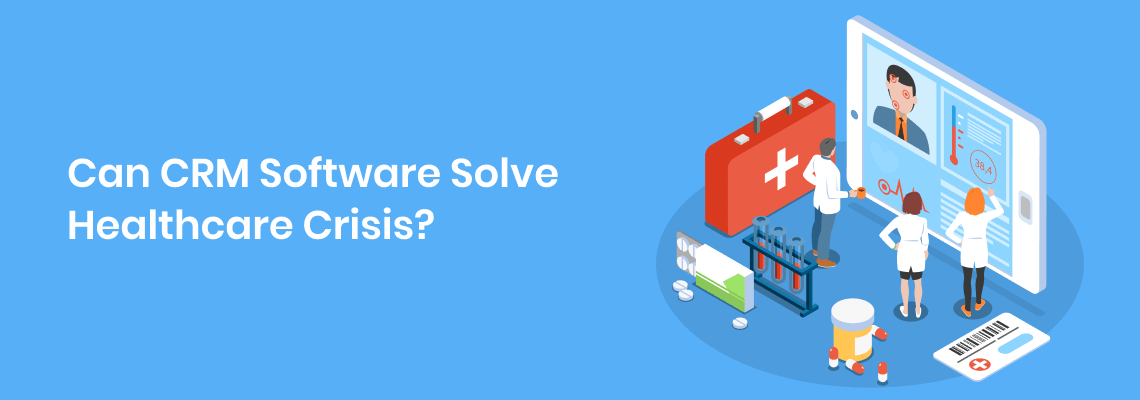
I have closely thought in-line with the recent importance of health services, solutions, and the market. There are many proponents of HCRMs who are providing health services.
If the healthcare system wants to take a giant leap, it is important to establish coordination between people, HCRMs, and service providers to provide high-quality patient care, at a reasonable cost, and in less time.
HCRM can make intelligent profiles of the patients and service providers to make the process of quality care continuous. For the future success of a nation, investment is required in such software to let everyone live healthy at affordable clinical diagnostic activities.
The professionals who run hospitals, clinics, radiology groups, test labs, health systems, and institutional pharmacies, get a 360-degree view of all healthcare-related business activities via a CRM. Additionally, all the staff members and employees in a healthcare organization work together as CRM increases team collaboration and communication; thus, delivering the best patient experience.
Now, let's come to data and CRM! Every single person in a country has a history of his/her health problems. As a result, the amount of information is endless and abundant. If we collect this raw healthcare data in a CRM and process it, then a new medical intelligence can exist in the future guaranteeing better healthcare to the patient. Besides this, the data would make communication and information better for a country.
My suggestion is to use CRM, where all healthcare professionals get critical real-time information every day for providing an affordable higher quality of care!
How Healthcare CRM Features Easily Provide Better Services?
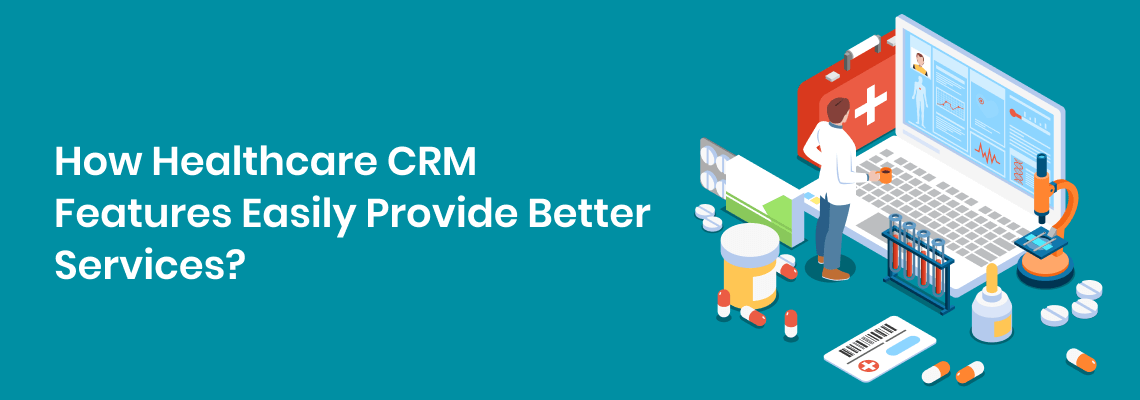
Nowadays, it is rare for the patients to walk in a clinic, hospital, or dispensary and decide to opt for a doctor. Today, we live in a digital era where the tech-savvy patients go on to the internet, search for the affordable best-in-service doctors via their previous patients' experiences, exploring reviews, and the services they give!
And once this holistic research is over, the patient decides on a doctor, books an appointment, and then walks into the doctor's clinic. Today, this kind of patient-centric infrastructure is available in Western and European countries, but not in the developing nations and third-world countries of Asia.
The strength of CRM lies in finding out new customers via different marketing channels and data collection strategies to make its effective use in business.
Once you configure the healthcare CRM and its features, you will agree with me that CRM can become the leading software in the healthcare industry. Unarguably, the CRM would set new trends and dimensions to meet the patient expectations of quality healthcare services.
And who would not visit a brand that cares and provides the best health services and Telemedicine at affordable rates?
Also Read: Benefits Of CRM Software That Can Help Your Company Find Success
To become a unique brand in the healthcare industry, you need to understand some basic features of a healthcare CRM as follows:
- Centralize Patient Information by including appointment scheduling, diagnosis & treatment details, test details, reports & documents, a detail of complete medical history, medication details, etc.
- Centralize Doctor Information that includes an entire profile of a doctor, appointment scheduling, and know the workload of doctors, etc. (A separate panel should be there for the doctors)
- HCRM must be able to make quick and insightful decisions
- A CRM must work on all operating systems, platforms, and devices
- CRM must be scalable, robust, flexible to use, Cloud-friendly, HIPAA-compliant, etc.
Patient-care/Hospital Panel services in the HCRM:
- Patient intake processing, easy-to-use billing services, outpatient services
- Profiling of medical facility for patient treatment support & transfer
- Credentialing & tracking system for the Physicians
- Integrated and sophisticated calendar service to save time
- Access to information for long-term patient care and health-risk assessments
- Access to information on disease & pre-disease management
- Access to corresponding specialist services through the CRM system
Some advanced features you can add to your CRM for the healthcare service providers are as follows:
- CRM can provide cutting-edge tools for HRs, assistants, operators, executives, communication channels, back-office software tools for inventory, purchasing, and more.
- Some smart features for administrators, physicians, nurses, and staff members retention.
- Streamlining operations, utilizing medic resources, and medical equipment.
- Also, some intelligent decision making features are required that guides the HCRM users in making better decisions during critical conditions.
Some of the best demanded Healthcare CRM features:
Team management: The best CRM in the healthcare sector would make fast and easy team collaboration & management by integrating HRM (Healthcare Relationship Management) modules, facilitating employee-related facilities, and assigning them to work quickly. The software streamlines all processes and tracks all services, departments, and facilities. A connection from patients to a healthcare provider will remain uninterrupted.
Marketing: Modern CRM tools in the healthcare business area combination of EHRs, CMSs, HRMs, MAPs, and much other software. This cluster of software makes real-time marketing campaigns across multiple channels. Furthermore, improve marketing performance, lead conversions, revenue collection, ROI, and bring out a personal one-to-one connection with every healthcare service consumer on the internet.
The tool assists in claiming insurance, tax reductions, discounts, billings, tracks, manages physicians and doctors. Thus, it not only takes care of patients but also cares about healthcare service providers and empowers the entire healthcare system.
The best feature of HCRM is that it easily integrates with the other software, which is very crucial in the existing healthcare system. All of these functionalities aim at increasing the efficiency of providing healthcare to every patient's lifecycle.
Therefore, to make a fully automated healthcare CRM, you need to add all these features into it and make the final software product HIPAA-complaint!
How to Build a Healthcare CRM?
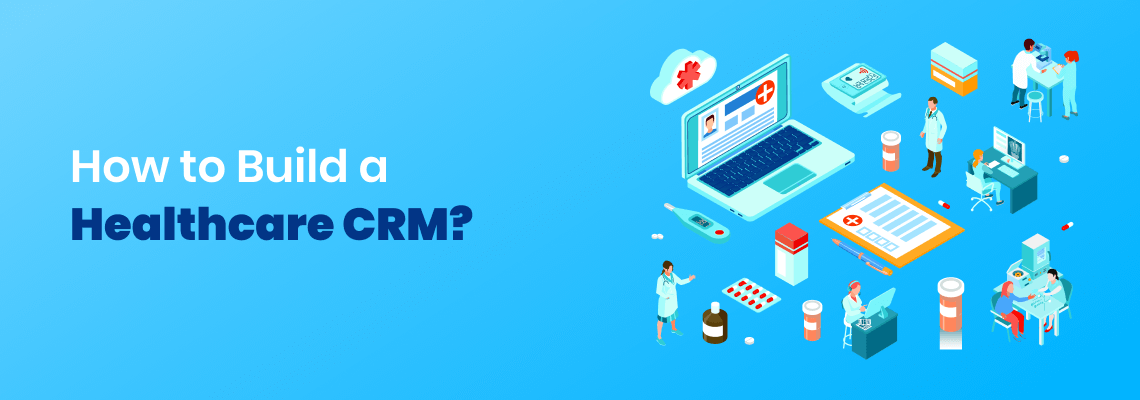
From our above discussions, you now clearly know the definition, importance, benefits, use cases, features, and functionalities of a healthcare CRM system. Also, you know market shares of different CRMs, and how HCRM solves the system crisis in healthcare!
With this much knowledge, you need to plan and implement the CRM software development process to get a quality business software product in the healthcare industry. Thus, invest in healthcare CRM software and provide quality care service to patients.
However, building a healthcare CRM will not be easy as you will have to get involved with an IT entrepreneur or an IT expert. And in the market, there are a plethora of healthcare CRM software development companies and each of them is unique and meets your specific needs in different manners.
Hence, to select a software development company, you have to make some decisions:
- Research more about healthcare CRM, list the features and functionalities you want. For this, you can refer to hundreds of CRMs that would become your competitors.
- Select a top healthcare software development company in USA. View the company’s profile, past work experience, reviews, customer feedback, talk to their developers, visit their Upwork profiles, etc.
- Find out more about the company’s post-deployment support services that align best with your requirements.
- Plan out a complete development process, in addition to maintenance!
- Make your software multiplatform, multi-operating system, and multi-device capable.
- Also, note how the development company would help you in the future with the developed HCRM.
- By the time development continues, you keep taking daily reports, and explore different marketing techniques in CRM.
- Try understanding different engagement models!
Remember, to follow the best software development methodologies like Agile & DevOps methods to create a CRM for healthcare service providers. Furthermore, keep your CRM mobile platform friendly as it will prove beneficial in field force, marketing team, staff, and employees providing quick services.
Yes, developing a mobile CRM application for healthcare would be a great idea!
What are your thoughts on it? Mention them in the comment section below!
Also Read: Best CRM Software: Guide And Reviews For Small Businesses
We already told you that the use of CRM has been increasing the healthcare industry. As a result, CRM became the latest first-class competitor to HRM software (Healthcare Relationship Management). The new relationship management software in the healthcare sector are highly equipped and offers better performance.
However, you have a big target in healthcare CRM development, i.e., to make CRM affordable, rich-in-features, scalable, and robust. Additionally, you can make intelligent CRM by including technologies like Artificial Intelligence, Blockchain, Machine Learning, and Data Handling.
These technologies are the future in the software development industry. Many companies are in the race to launch an AI-powered CRM for healthcare services. Why do you want to lag?
“An ideal CRM in the healthcare industry would let you integrate other healthcare software such as EHR, EMR, PMS, HRM, QMS, RMS, MAP, etc. with the latest technologies and cloud-based options. However, the CRM must be HIPAA-compliant.”
Conclusion: What Is The Future of Healthcare CRM?
In today's increasingly digital world, exciting transformations are happening in healthcare technologies. The digital health systems have come into existence. At the times when we must provide easy to access and affordable healthcare services, the digital evolution of healthcare has made patient care services costly.
We view CRMs as a new marketing platform for hospitals and healthcare service providers, promising increased consumer engagement, easily understanding consumer health needs, mastering data to drive future innovations in the healthcare space, and providing affordable quality patient care services according to their expectations.
All the best and make a custom healthcare CRM that overcomes all the challenges and make healthcare more meaningful!

